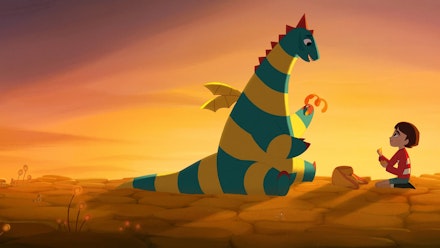Has Cartoon Saloon ‘gone Hollywood?’ My Father’s Dragon, based on the beloved 1948 children’s book by Ruth Stiles Gannett, is the first film from the Irish animation studio made for Netflix, with outside contributors joining, too (American screenwriter Meg LeFauve, who also worked on Pixar movies like Inside Out and The Good Dinosaur, co-wrote the script).

It’s a relief, then, to see their lovingly hand-drawn 2D aesthetic fully intact. Moving away from the studio’s staple Celtic myths, this charming film from director Nora Twomey (who earned an Oscar nomination for her gorgeous Afghanistan-set film The Breadwinner) tells the simple story of a troubled boy (voiced by Jacob Tremblay) who befriends an equally worrisome dragon (Gaten Matarazzo). It’s undeniably made for kids first, and while it doesn’t hit the visual lusciousness or emotional resonance of Song Of The Sea — still, arguably, Cartoon Saloon’s high-water mark — it is so beautifully crafted, so rich in detail, that grown-ups will be spellbound in other ways.
The animation is a lovely blend of clean lines and fuzzy details.
The film opens with a quiet tragedy, when Elmer and his mother fall on hard times and the shop they own shuts down (it’s implied that their community has become a ghost town, somewhere in post-Depression America). So they emigrate to the city of ‘Nevergreen’, which, as its name suggests, is a forever-grey sort of place, full of rain and faceless figures. But Twomey’s designers and animators find beauty even in the bleakness, artistry and stylisation in the repeated, exaggerated cityscape. There’s attention to detail like this everywhere. The animation is a lovely blend of clean lines and fuzzy details, and the character design is imaginatively caricaturish — note the baby alligators with giant, bulbous eyeballs.
That careful craft continues with the voice acting. Jacob Tremblay (whose voice broke during the recording sessions, though they’ve hidden it well) is the film’s beating heart, earnest and sweet-natured but still clearly too young to comprehend emotional trauma; elsewhere, there’s goofy, garrulous voice work from Matarazzo, who brings humour and humanity to his winged wingman, a mythical beast who enjoys a good armpit-fart. Shout-out, too, to Whoopi Goldberg as a talking black cat, which has echoes of Studio Ghibli’s Jiji from Kiki’s Delivery Service.
While it’s not short on eccentric humour — one man in a shop asks to buy rubber bands “to keep beards out of soup” — there are plenty of powerful lessons about growing up, taking responsibility for your actions, and understanding the weight of what that means. As the film progresses, the focus leans heavily on Boris taking a dragon rite-of-passage: he must lift an island from its sinking fate, and in doing so will earn his fire and the transition to ‘afterdragon’. That journey becomes occasionally over-plotted, somewhat stifled by a sense of manufactured peril. But it all ends on a truly beautiful note: one of heartfelt friendship, of young people coming-of-age, and an acceptance of fear that young shoulders struggle to bear. This is a warm, rich, hand-crafted hug of a film.



